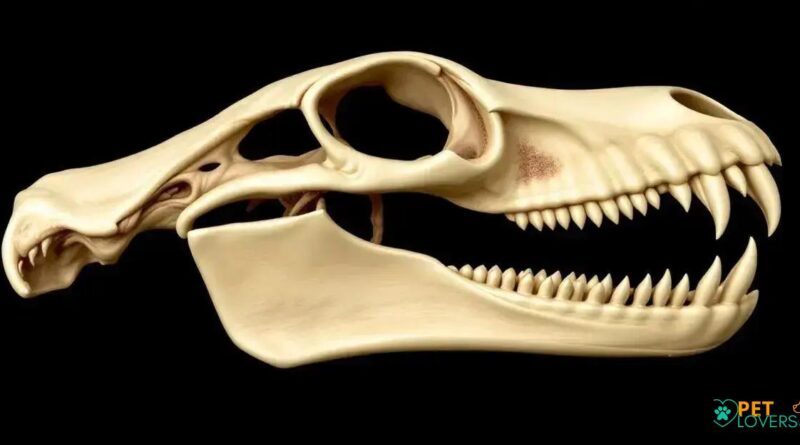Understanding Dog Jaw Anatomy: The Key to Canine Health
Maintaining your dog’s jaw health requires understanding its anatomy, identifying common dental problems, scheduling regular veterinary visits, and implementing key care practices such as brushing their teeth and offering dental chews to promote oral hygiene.
Dog jaw anatomy plays a crucial role in your pet’s overall health and well-being.
Understanding the structure and function of a dog’s jaw can help you better care for your furry friend.
In this article, we will delve into the fascinating details of canine jaw anatomy, explore common dental issues that may arise, and provide tips for maintaining your dog’s oral health.
Knowing how your dog’s jaw works can make a significant difference in their quality of life.
The Structure of a Dog’s Jaw
The structure of a dog’s jaw is complex and vital for their overall function. Dogs possess a unique jaw structure that allows them to effectively grasp, chew, and process their food. The jaw consists of several key components: the mandible (lower jaw), the maxilla (upper jaw), and various types of teeth designed for specific purposes.
The mandible is a single bone that forms the lower jaw and can move up and down, allowing your dog to open and close their mouth. The maxilla houses the upper teeth and plays a crucial role in the alignment and function of the jaw.
Most dogs have a set of incisors for grasping and nipping, canines for tearing, and premolars and molars for grinding their food. This diversity in teeth shapes and functions supports their dietary needs as carnivores. Proper alignment of these components is essential for efficient eating and prevents issues like misalignment or overcrowding.
Common Dental Issues in Dogs
Common dental issues in dogs can significantly impact their health and quality of life. Just like humans, dogs are prone to dental problems that can lead to pain and discomfort. One of the most prevalent issues is periodontal disease, which affects the tissues surrounding the teeth. This condition begins with plaque buildup that hardens into tartar, resulting in gum inflammation.
Another frequent issue is tooth decay, which can occur if food particles are not removed properly. Symptoms include bad breath, swollen gums, and visible tartar. Oral tumors are also a concern; they can be benign or malignant and affect a dog’s ability to eat.
Dogs can develop fractured teeth due to chewing on hard objects or during rough play. These fractures can expose the inner pulp, leading to infection and severe pain. Regular veterinary check-ups are essential to catch these problems early.
Preventing these dental issues requires consistent dental care, including tooth brushing, dental chews, and regular professional cleanings. Understanding these common dental issues can help dog owners take better care of their pets’ oral health.
How Jaw Anatomy Affects Eating
How jaw anatomy affects eating is critical for your dog’s health. The design of a dog’s jaw allows them to efficiently process food. With a strong mandible and maxilla, dogs can easily grasp, chew, and tear their meals. Their teeth are specifically shaped for different tasks, enabling them to handle various types of food.
The shape of the jaw and the arrangement of the teeth directly influence how dogs eat. For instance, a dog’s bite is adapted to their natural diet, which often consists of meat. This specialization allows them to consume food effectively, ensuring they get the necessary nutrients.
When jaw anatomy is compromised, such as in cases of misalignment or dental disease, a dog may have difficulty eating. They may avoid hard food or show signs of discomfort while chewing. This can lead to further health issues, including nutritional deficiencies.
Additionally, jaw movement facilitates not only biting and chewing but also the essential action of salivation, which helps in digestion. Understanding how the jaw works can help you cater to your dog’s dietary needs better.
Importance of Regular Dental Check-ups
The importance of regular dental check-ups for your dog cannot be overstated. Just like humans, dogs require routine dental care to maintain their oral health. These check-ups help to deter dental diseases before they become serious problems. During a visit, a veterinarian can perform a thorough examination of your dog’s mouth, checking for tartar buildup, gum disease, and other potential issues.
Regular dental visits can identify conditions like periodontal disease early on, which can lead to tooth loss if not treated. Additionally, the vet can provide professional cleaning, removing plaque and tartar that you might miss at home. This cleaning is crucial to prevent bad breath and keep your pet comfortable.
Another reason for these check-ups is that dental health is linked to a dog’s overall health. Poor oral hygiene can contribute to other health issues like heart disease and kidney problems. Therefore, maintaining your dog’s dental health can lead to a longer, happier life.
It’s generally recommended to schedule dental check-ups at least once a year. Your veterinarian might suggest more frequent visits if your dog has existing dental issues or specific health concerns. By prioritizing regular dental check-ups, you can help ensure that your dog stays healthy and happy for years to come.
Tips for Maintaining Your Dog’s Jaw Health
Tips for maintaining your dog’s jaw health are essential for overall well-being. Regular dental care is one of the most important aspects. Brushing your dog’s teeth frequently helps prevent plaque and tartar buildup. Use a toothbrush and toothpaste specifically designed for dogs to ensure safety and effectiveness.
Incorporating dental chews into your dog’s diet can also support oral health. These chews work to mechanically clean the teeth and massage the gums, reducing the risk of dental problems. Always choose products that are appropriate for your dog’s size and chewing style.
Providing fresh water at all times encourages your dog to stay hydrated and helps rinse food particles from their mouth. Additionally, you should consider regular vet visits for professional dental cleanings. A veterinarian can perform comprehensive evaluations and cleanings that you can’t replicate at home.
Monitor your dog’s mouth for any signs of discomfort or changes in eating habits, as these can indicate dental issues. Look for bad breath, swollen gums, or difficulty chewing. If you notice these signs, consult your veterinarian for advice and treatment.
Lastly, provide a healthy diet that supports dental health. High-quality kibble can help reduce plaque, while certain wet foods may promote dental issues. Balancing types of food can contribute to better oral hygiene.
Conclusion: Supporting Your Dog’s Jaw Health
Maintaining your dog’s jaw health is vital for their overall well-being. Understanding the structure of the jaw, common dental issues, and how anatomy affects eating can empower you to take better care of your pup.
Regular dental check-ups are essential in preventing serious problems from developing, while effective home care practices can keep their teeth and gums healthy. By following simple tips like brushing, providing dental chews, and ensuring a healthy diet, you can significantly improve your dog’s oral health.
Paying attention to your dog’s habits and taking prompt action when issues arise can make all the difference. With proper care and attention, you can help your furry friend enjoy a happy and healthy life.
FAQ – Frequently Asked Questions about Dog Jaw Health
What is the structure of a dog’s jaw?
A dog’s jaw consists of the mandible (lower jaw), maxilla (upper jaw), and various types of teeth designed for specific functions.
What are common dental issues in dogs?
Common issues include periodontal disease, tooth decay, fractured teeth, and oral tumors, all of which require regular monitoring.
How does jaw anatomy affect eating in dogs?
Jaw anatomy, including the shape and arrangement of teeth, allows dogs to effectively grasp, chew, and process their food.
Why are regular dental check-ups important?
Regular check-ups can identify dental issues early, prevent serious diseases, and promote overall health in your dog.
What tips can help maintain my dog’s jaw health?
Brushing their teeth, providing dental chews, ensuring fresh water, and offering a healthy diet are all important for jaw health.





